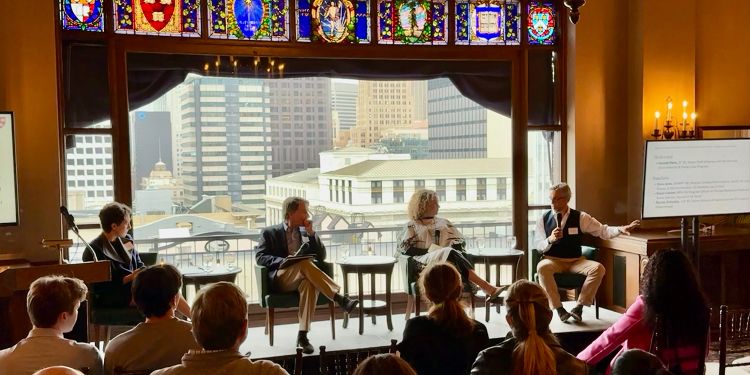Are you interested in connecting with other alumni leveraging their careers to confront climate change? BEI invites HBS Alumni to join our Alumni in Climate Networking Series for a chance to connect with local alumni to discuss ideas, trends, opportunities, and challenges at the intersection of business and the environment. Email bei@hbs.edu to learn more about upcoming events.
The Salata Institute for Climate and Sustainability, in collaboration with Harvard Business School’s Business and Environment Initiative (BEI) and Harvard Law School’s Environmental & Energy Law Program (EELP), hosted a panel and networking reception during San Francisco Climate Week at the University Club of San Francisco focused on how communities, businesses, and governments can respond to climate-driven disasters through innovative financial tools and cross-sector collaboration.
The evening was moderated by Hannah Perls (JD ’20), Senior Staff Attorney at Harvard's EELP and Lecturer on Law at Harvard Law School, whose work focuses on equitable disaster preparedness and federal environmental justice policy. She opened the panel by framing the conversation around the intersection of risk, equity, and systemic resilience.
Panelist Dave Jones (JD/MPP ’88), Director of the Climate Risk Initiative at UC Berkeley School of Law, brought extensive experience in public service and regulatory leadership, having served two terms as California’s Insurance Commissioner. He discussed the growing fragility of the insurance market in the face of worsening climate events and called attention to the increasing number of U.S. regions becoming "uninsurable." Jones advocated for integrating risk-reducing investments—such as forest management and home hardening—into insurance pricing models, referencing recent pilot programs and policy efforts in California and beyond.
Joining him was Kayla Calkins (MPA ’24), a recent graduate of Harvard Kennedy School and Program Officer at the Climate Resilience Fund. Calkins, who also serves as a Senior Advisor at Insurance for Good and a local elected board member in Oregon, provided insight into the human impacts of disaster and the importance of community-centered resilience strategies. Drawing from her work in wildfire mitigation and emergency preparedness, she emphasized the role of insurance as a form of financial resilience and discussed emerging approaches like parametric insurance and community catastrophe coverage.
Barney Schauble (AB ’95), Senior Advisor at Nephila and Principal of Greenthread, brought a global capital markets perspective to the conversation. Having spent decades in reinsurance and catastrophe risk finance, Schauble explained how shifts in climate risk are increasingly reflected in reinsurance pricing—often well before they surface in public discourse. He called for deeper alignment between insurance markets, investor risk signals, and land-use decisions, urging policymakers and communities to respond to the early warnings already embedded in pricing data.
Together, the panel painted a challenging picture of the climate risk landscape—from growing disaster frequency and financial volatility to insurance market withdrawal and mortgage instability. Yet, the discussion also highlighted promising innovations and pathways forward. From strengthening building codes and nature-based resilience to leveraging insurance to reward proactive risk mitigation, panelists offered tangible strategies for shifting from crisis response to long-term adaptation.
The conversation concluded with audience questions and a lively networking reception that brought together alumni, students, practitioners, and faculty from across Harvard’s climate ecosystem. The event underscored the Salata Institute’s commitment to convening alumni and cross-sector leaders to accelerate real-world climate solutions through research, policy, and collaborative action.

